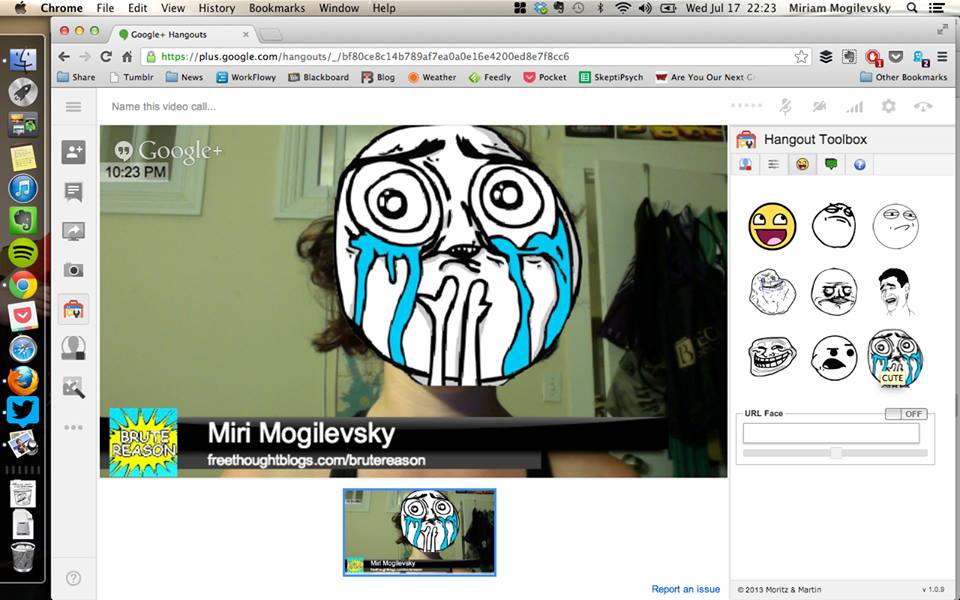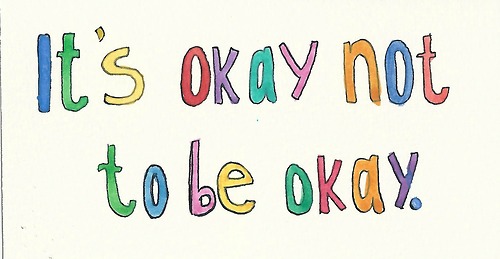There’s a certain scorn reserved for people who diagnose themselves with mental illnesses–people who, based on their own research or prior knowledge, decide that there’s a decent chance they have a diagnosable disorder, even if they haven’t (yet) seen a professional about it.
I understand why psychologists and psychiatrists might find them troublesome. Nobody likes the idea of someone getting worked up over the possibility that they have a mental illness when they really don’t. Professional mental healthcare workers feel that they know more about mental illness than the general population (and, with some exceptions, they do) and that it’s their “job” to serve as gatekeepers of mental healthcare. This includes deciding who is mentally ill and who is not.
Self-diagnosis also gets a bad rap from people who have been professionally diagnosed with a mental illness. They feel that people who self-diagnose are doing it for attention or because they think that diagnosis is trendy.
This actually bothers me much more than the arguments against self-diagnosis coming from professionals. Why?
Because the claim that people who self-diagnose are just “doing it for attention” or because they think it’s “cool” is the exact same claim frequently made about people who get diagnosed professionally.
To be clear, I’m not saying that people never label themselves as mentally ill for attention. Maybe some do. Maybe a significant proportion of people who self-diagnose don’t really have a mental illness at all. I’d have to see research to know, and from my searches so far I haven’t really found much research on the phenomenon of self-diagnosis. (But I’m taking note of this for my master’s thesis someday.)
However, there’s a difference between someone who’s feeling sad for a few days and refer to themselves as “depressed,” and someone who’s been struggling for weeks, months, or years, and who has read books and articles on the subject and studied the DSM definition of the illness. The former may not even count as “self-diagnosis,” but rather as using a clinical term colloquially–just like everyone who says “oh god this is so OCD of me” or “she’s totally schizo.” (This, by the way, is wrong; please don’t do it.)
(It’s also likely the case that some people self-diagnose because they have hypochondria. However, the problem is not that they are self-diagnosing. The problem is that they have untreated hypochondria. Maybe diagnosing themselves with something else will get them into treatment, where a perceptive psychologist will diagnose them with hypochondria and treat them for it.)
Even if some people who self-diagnose are wrong, I still think that we should refrain from judging people who self-diagnose and take their claims seriously. Here’s why.
1. It gets people into treatment.
I wish we had a system of mental healthcare–and a system of social norms–in which everyone got mental health checkups just as they get physical health checkups. For that, two main things would have to change–mental healthcare would have to become affordable and accessible for everyone, and the stigma of seeing mental health professionals (whether or not one has a mental illness) would have to disappear. (There are other necessary conditions for that, too–the distrust that many marginalized people understandably have for mental healthcare would have to be alleviated, and so on.)
For now, going to see a therapist or psychiatrist is difficult. It requires financial resources, lots of time and determination, and a certain amount of risk–what if your employer finds out? What if your friends and family find out (unless they know and support you)? What will people think?
Because the barriers to seeing a professional are often high, many people need a strong push to go see one. Having a strong suspicion that you have a diagnosable mental illness can provide that push for many people, because nobody wants to go through the hassle of finding a therapist that their insurance covers (or finding a sliding-scale one if they don’t have insurance), coming up with the money to pay the deductible, taking time off work to go to the appointment, dealing with the fear of talking to a total stranger about their feelings, and actually going through with the appointment, only to be told that there’s “nothing wrong” with them.
As much as I wish things were different, the reality right now is that relatively few people go to therapists or psychiatrists unless they believe that they have a mental illness. If self-diagnosing first gets them into treatment, then I don’t want to stigmatize self-diagnosis.
2. It helps them find resources whether or not they see a professional.
In the previous point, I explained that for many people, self-diagnosing can be a necessary first step to getting treatment from a professional. In addition, once people have diagnosed themselves, they are able to seek out their own resources–books, support groups, online forums, etc.–to help them manage their symptoms. This can be extremely helpful whether or not they’re planning on getting treatment professionally.
While psychiatric labels like “depression,” “generalized anxiety,” and “ADHD” have their drawbacks, they are often necessary for finding resources that help people understand what they’re going through and help themselves feel better. If I’m at a library looking for books that might help me, asking the librarian for “books about depression” or “books about ADHD” will be much more useful than asking them for “books about feeling like shit all the time and not wanting to do anything with friends” or “books about getting distracted whenever you start work and not really having the motivation to finish any of it and it has nothing to do with laziness by the way.” Same goes for a Google search.
It’s certainly fair to be worried that people looking on their own will find resources that are unhelpful or even dangerous. But I think this is less of a problem with self-diagnosis per se, and more of a problem with the lack of scientific literacy in our society, and the lack of emphasis on skepticism when evaluating therapeutic claims. For what it’s worth, going to see a mental health professional will not necessarily prevent you from encountering quackery and bullshit of all kinds. And in any case, the blame does not lie with the people who self-diagnose and then fall for pseudoscientific scams, but with the people who perpetrate the scams in the first place.
This point is especially important given that many people will not be able to access professional mental healthcare services for various reasons. Maybe they can’t afford it; maybe they work three jobs and don’t have time; maybe they can’t find a therapist who is willing to accept the fact that they are trans*, kinky, poly, etc. Maybe they are minors whose parents are unwilling to get them into treatment. Maybe they were abused by medical professionals and cannot go back into treatment without worsening their mental health.
There are all kinds of reasons people may be unable to go and get their diagnosis verified by a professional, and most of these are tied up in issues of privilege. If you have never had to worry that a doctor or psychologist will be prejudiced against you, then you have privilege.
3. It can help with symptom management whether you have the “real” disorder or not.
At one point when my depression was particularly bad I noticed that I had some symptoms that were very typical of borderline personality disorder. For instance, I had a huge fear that people would abandon me and I would bounce back and forth between glorifying and demonizing certain people. If someone made the slightest criticism of me or wasn’t available enough for me, I would decide that they hate me and don’t care if I live or die. I had wild mood swings. That sort of thing. It’s not that I thought I actually had BPD; rather, I noticed that I had some of its symptoms and wondered if perhaps certain techniques that help people with BPD might also help me.
Luckily, at this time I was still seeing a therapist. So in my next session, I decided to mention this observation that I had made, and the conversation went like this:
Me: I’ve noticed that I have some BPD-like symptoms.
Her: Oh, you don’t have BPD.
Me: Right, but I seem to have some of its symptoms–
Her: No, trust me, I’ve worked with people with BPD and you do NOT have BPD.
I suppose I could’ve persevered with this line of thinking, but instead I felt shut down and put in my place. I dropped the subject.
So determined was this therapist to make sure that I know which mental illness(es) I do and do not have that she missed out on what could’ve been a really useful discussion. What she could’ve done instead was ask, “What makes you say that?” and allow me to discuss the symptoms I’d noticed, whether or not they are indicative of BPD or anything else other than I am having severe problems relating to people and dealing with normal life circumstances.
The point is that sometimes it’s useful to talk about mental illness not in terms of diagnoses but in terms of symptoms. What triggers these symptoms? Which techniques help alleviate them?
So if a person looks up a mental disorder online and thinks, “Huh, this sounds a lot like me,” that realization can help them find ways to manage their symptoms whether or not those symptoms actually qualify as that mental disorder.
This is especially true because the diagnostic cut-offs for many mental illnesses are rather random. For instance, in order to have clinical depression, you must have been experiencing your symptoms for at least two weeks. What if it’s been a week and a half? In order to have anorexia nervosa, you must be at 85% or less of your expected body weight*. What if you haven’t reached that point yet? What if you don’t have the mood symptoms of depression, but you exhibit the cognitive distortions associated with it? Acknowledging that you may have one of these disorders, even if you don’t (yet) fit the full criteria, can help you find out how to manage the symptoms that you do have.
4. It helps them find solidarity with others who suffer from that mental illness.
I understand why some people with diagnosed mental illnesses feel contempt toward those who self-diagnose. But I don’t believe that sympathy and solidarity are finite resources. If someone is struggling enough that they’re looking up diagnostic criteria, they deserve support from others who have been down that path, even if their problems might not be “as bad” as the ones other people have and/or have not yet been validated by a professional.
Acknowledging that you may have depression (or any other mental illness) can help you find others who have experienced various shades of the same thing and feel like you’re not alone.
My take on self-diagnosis comes from a perspective of harm reduction. The idea is that strategies that help people feel better and prevent themselves from getting worse are something we should support, even if these strategies are not “correct” or “legitimate” and do not take place within the context of established, professional mental healthcare.
We should work to improve professional mental healthcare and increase access to it, especially for people in marginalized communities and populations. However, we should also acknowledge that sometimes people may need to help themselves outside of that framework. These people should not be getting the sort of condescension and eye-rolling they often get.
~~~
*The diagnostic criteria for eating disorders are expected to improve with the release of the new DSM-V, but I’m not sure yet whether or not the 85% body weight requirement will still be there. In any case, this is how it’s been so far.








